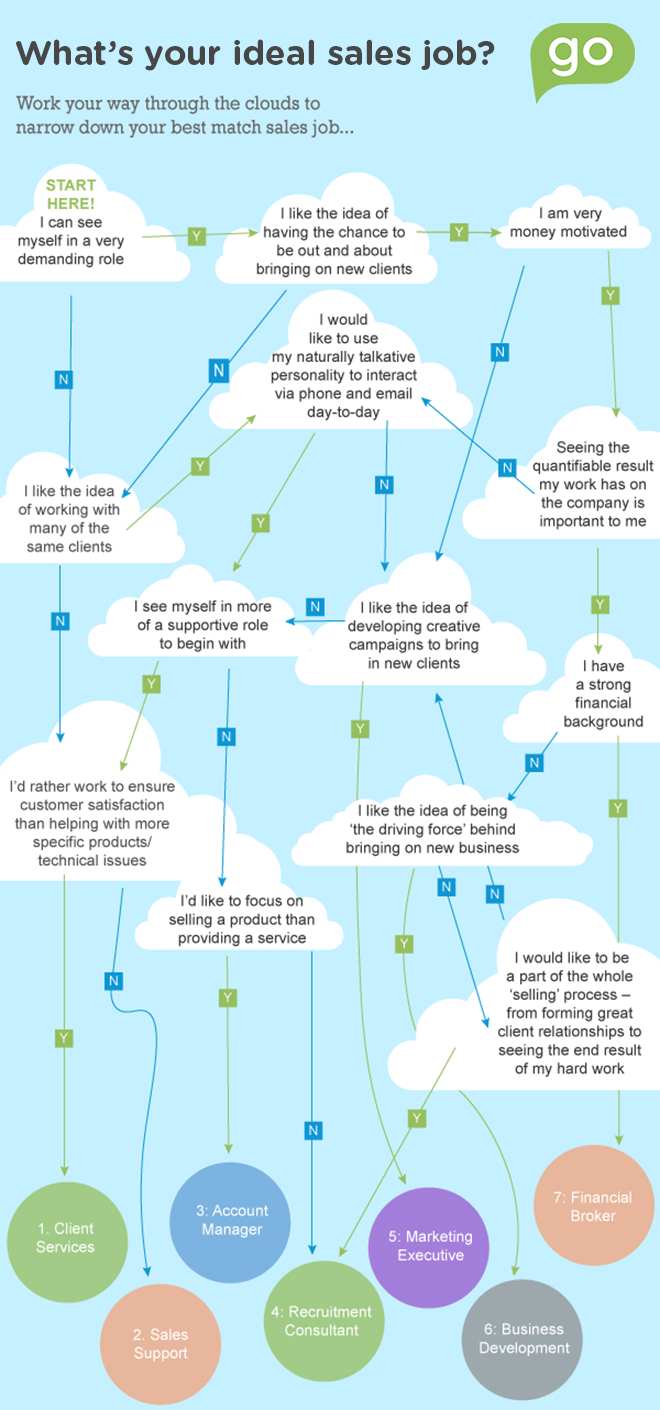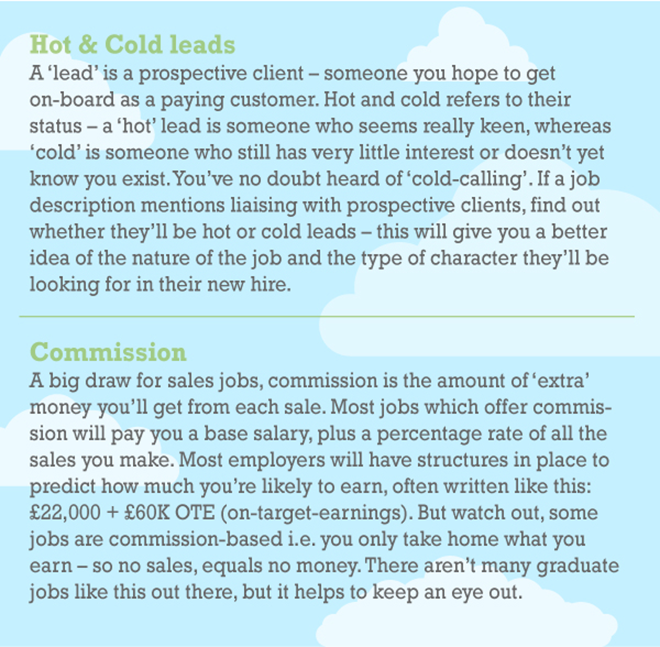“I just don’t want to do sales” – we hear it all the time.
You’re not alone if the mere mention of a graduate job in sales leaves you cringing with distaste, as your mind conjures up images of a pushy car salesman selling overpriced knock-offs no one really wants.
Fast forward to the 21st century and ‘sales’ jobs come in all shapes and sizes – from IT support and marketing executive to recruitment and financial broking.
Every business needs sales to expand, but with so many graduate roles out there, how do you know which one could be right for you? (and which ones definitely don’t involve getting an angry stranger hanging up on you?!)
We decided to break it down for you…
Remember! Like all graduate jobs, the name and description of the roles differ between companies – so always read through the job description carefully.
Some of these roles will require previous experience, so be sure to take the time to see how you match up before applying.

Types of jobs in sales
1. Client Services
Helpful is your middle name.
In client services, your main focus is to make sure customers are happy.
You’ll be dealing with people who are already interested in what the company has to offer or ‘post’-sales, so the ‘selling’ part of the role is more helping and advising on what products or services are right for them.
2. Sales Support
What it says on the tin – you’ll be working to assist the sales process either ‘pre’- or ‘post’- sales.
This can look quite different depending on the sector e.g. in finance, you could be processing invoices, drawing up contracts and handing correspondence to support the Sales Executives.
Whereas IT sales support looks more like demonstrating technical features, solving faults and advising on user training methods.
Depending on the role you might find you can run into some frustrated customers – everyone has a panic when things go wrong!
3. Account Manager
One of the most varied of sales jobs, your role as an Account Manager can vary from company to company.
But at the heart of it, account management is the key ‘link’ between client and company.
Here, you ‘sell’ usually via phone, to long-standing clients by introducing new products to them or helping them make the most of existing products.
It may involve some reaching out to new potential clients, but how this looks can vary between sectors.
4. Recruitment Consultant
If you want the chance to be your own boss, this job has your name all over it.
In recruitment, you’ll find yourself almost non-stop, as you spread your time between visiting client businesses, networking, reviewing candidates, managing interviews and negotiating salary rates … phew!
Although a mix between desk-based and face-to-face, you’ll be interacting with people every minute of the day.
Parts of the job involve reaching out to new businesses, which can mean some rejection.
But as with most recruiters, you’ll find that once you’ve built yourself a solid client base, the rewards soon follow.
Find out more information about what it’s like working in recruitment.
5. Marketing Executive
The more creative approach to selling.
This job involves promoting or ‘selling’ to new and interested customers in more unconventional ways.
You’ll be less directly involved with the customer face-to-face or over the phone, instead, you’ll use all elements of the marketing mix to ‘sell’.
But don’t be fooled – you’ll need to keep track of how effective your campaigns are, to show how you’re contributing to overall sales!
6. Business Development
Not for the faint-hearted – in working in business development you’re at the forefront of business growth.
You’ll be tasked with spotting new business opportunities and securing them as clients.
Often very face-to-face, much of your time will be meeting prospective clients, giving presentations, negotiating, and explaining new products.
Being able to get your points across clearly, negotiate, and ‘click’ with people is a must and the key to selling in this job.
7. Financial Broker
Straight-up sales – broking is all about buying and selling securities (e.g. shares and stocks) on behalf of your client. A very demanding role, it takes a unique mix of expert financial analysis and ‘traditional’ selling to master.
You’ll find yourself ‘switched on’ for long hours of the day as you put your keen financial knowledge to the test.
If you’re thinking about the graduate sales route, here are a few more things to take note of: While one quiz won’t define the job you’re destined to do for the rest of forever, it’s a good idea to know just how broad the ‘sales’ spectrum is.
So next time you’re asked “Have you considered a graduate job in sales?” – it might just be worth digging below the surface to discover what’s really involved.
Click here to find out about the difference between Broking and Trading jobs.

Want to get stuck into finding a job? Check out our sales roles and our jobs in retail for the best sales-related graduate opportunities.







